
Bubble tea is a tea-based drink that originated in Taiwan in the early 1980s. Taiwanese immigrants brought it to the United States in the 1990s, initially in California through regions including Los Angeles County, but the drink has also spread to other countries where there is a large East Asian diaspora population.
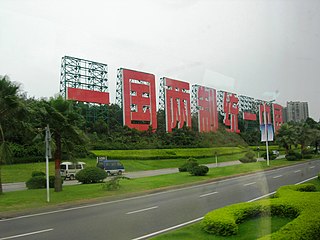
"One country, two systems" is a constitutional principle of the People's Republic of China (PRC) describing the governance of the special administrative regions of Hong Kong and Macau.
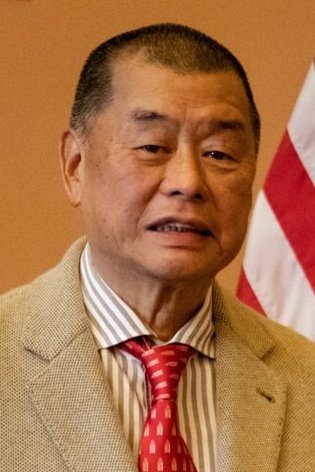
Lai Chee-ying, also known as Jimmy Lai, is a Hong Kong businessman and politician. He founded Giordano, an Asian clothing retailer, Next Digital, a Hong Kong-listed media company, and the popular newspaper Apple Daily. He is one of the main contributors to the pro-democracy camp, especially to the Democratic Party. Although he is known as a Hong Kong political figure, he has been a British national since 1996. Lai is also an art collector.
Milk tea refers to several forms of beverage found in many cultures, consisting of some combination of tea and milk. The term milk tea is used for both hot and cold drinks that can be combined with various kinds of milks and a variety of spices. This is a popular way to serve tea in many countries, and is the default type of tea in many South Asian countries. Beverages vary based on the amount of each of these key ingredients, the method of preparation, and the inclusion of other ingredients Milk tea is the default type of tea in India and Pakistan and referred to as chai.

The Civil Human Rights Front (CHRF) was an organisation that focused on the issues of Hong Kong politics and livelihood, affiliated with almost all pan-democratic camps in Hong Kong. It was founded on 13 September 2002 and disbanded on 15 August 2021.
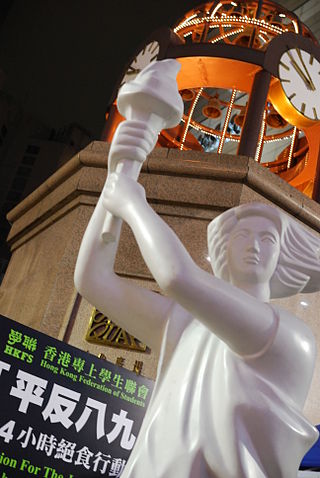
In the days following the end of the 1989 Tiananmen Square protests and massacre, several memorials and vigils were held around the world for those who were killed in the demonstrations. Since then, annual memorials have been held in places outside of mainland China, most notably in Hong Kong, Taiwan and the United States.

Joshua Wong Chi-fung is a Hong Kong activist and politician. He served as secretary-general of the pro-democracy party Demosisto until it disbanded following the implementation of the Hong Kong national security law on 30 June 2020. Wong was previously convenor and founder of the Hong Kong student activist group Scholarism. Wong first rose to international prominence during the 2014 Hong Kong protests, and his pivotal role in the Umbrella Movement resulted in his inclusion in TIME magazine's Most Influential Teens of 2014 and nomination for its 2014 Person of the Year; he was further called one of the "world's greatest leaders" by Fortune magazine in 2015, and nominated for the Nobel Peace Prize in 2017.
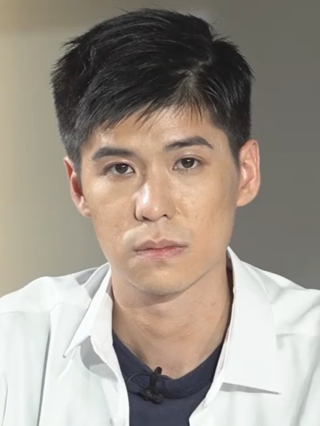
Lester Shum Ngo-fai is a Hong Kong social activist and politician. He was a leader of the 2014 pro-democracy protests in Hong Kong and served as deputy secretary-general of the Hong Kong Federation of Students (HKFS) from April 2014 to March 2015. He was a member of the Tsuen Wan District Council for Hoi Bun from 2020 to 2021.
Liberalism has a long tradition as an economic philosophy since the founding of Hong Kong as an entrepôt which cherishes private property, the free market, and free trade. In recent decades, Hong Kong has earned its international reputation as one of the "freest economies in the world". As a political trend, liberalism has become the driving force of the democratic movement since the 1980s which is mainly represented by the pro-democracy camp which strives for the universal suffrage, human rights and rule of law in Hong Kong.

Localist groups, or localist and self-determination groups, are the various groups with localist ideologies in Hong Kong. It emerged from post-80s social movements in the late 2000s which centred on the preservation of the city's autonomy and local lifestyles and opposed the perceived growing encroachment of the Chinese government on the city's management of its own political, economic, and social affairs.
During the Tiananmen Square protests of 1989, student organizations received a significant amount of support in the form of donated money, supplies, and equipment from both domestic and foreign sources.
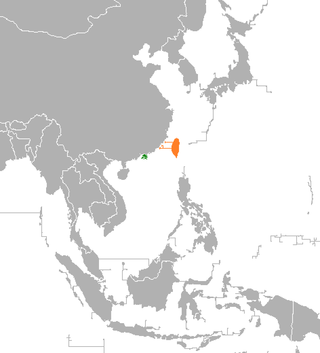
Relations between the government of Hong Kong and the Republic of China (Taiwan) encompass both when the Republic of China controlled mainland China, and afterwards, when the Republic of China fled to Taiwan.
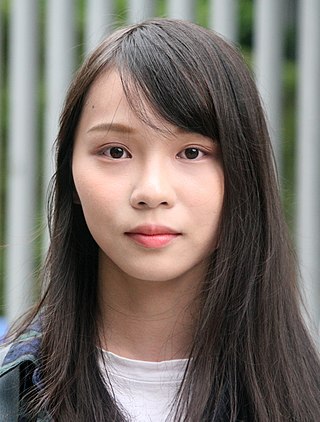
Agnes Chow Ting is a Hong Kong politician and social activist. She is a former member of the Standing Committee of Demosisto and former spokesperson of Scholarism. Her candidacy for the 2018 Hong Kong Island by-election, supported by the pro-democracy camp, was blocked by authorities, due to her party's advocacy of self-determination and independence for Hong Kong. She was arrested in August 2019, during the 2019–2020 Hong Kong protests, for her role in a protest at police headquarters two months earlier, and sentenced to 10 months in jail in December 2020. She was again arrested for the National Security charge of 'collusion with foreign forces' in August 2020, albeit released on bail the day after. After her early release in June 2021, she made no public announcements until December 2023, when she wrote on social media that she had already moved to Canada in September that year to study for a master's degree at a university in Toronto, and decided to go into exile.

Hong Kong Watch is a non-governmental organisation (NGO) based in the United Kingdom that was established to monitor the conditions of human rights, freedoms and rule of law in Hong Kong. It was founded by British human rights activist Benedict Rogers on 11 December 2017, two months after he was barred from entering Hong Kong.

Secession in China refers to several secessionist movements in the People's Republic of China. Many current separatist movements in China arise from the country's ethnic issues. Some of the factors that have created these ethnic issues include history, nationalism, economic and political disparity, religion, and other factors. China has historically had tensions between the majority Han and other minority ethnic groups, particularly in rural and border regions. Historically, other ruling ethnicities, such as the Manchu of the early-Qing dynasty, experienced ethnic issues as well.
Chinese censorship abroad refers to extraterritorial censorship by the government of the People's Republic of China, i.e. censorship that is conducted beyond China's own borders. The censorship can be applied to both Chinese expatriates and foreign groups. Sensitive topics that have been censored include the political status of Taiwan, human rights in Tibet, Xinjiang internment camps, the persecution of Uyghurs in China, the 1989 Tiananmen Square protests and massacre, the 2019–2020 Hong Kong protests, the COVID-19 pandemic in mainland China, the PRC government's COVID-19 pandemic response, the persecution of Falun Gong, and more general issues related to human rights and democracy in China.

The yellow economic circle, also known as the yellow economy, is a form of consumer activism in Hong Kong, in which businesses are classified based on their support or opposition to the 2019–2020 protests in the city. It was created by protesters to enable dollar voting and support like-minded businesses, sustain the livelihoods of pro-democracy business owners, create job opportunities for supporters of the movement, and reduce local dependence on businesses that are connected to the Chinese Communist Party. Local political analysts suggested that the yellow economic circle could have increased votes for the pro-democracy camp in the Catering, Wholesale, and Retail functional constituency in the later postponed 2020 legislative election.

The Hong Kong national security law, officially the Law of the People's Republic of China on Safeguarding National Security in the Hong Kong Special Administrative Region is a national law of China on Hong Kong national security passed in 2020. It is implemented in Hong Kong in accordance to Hong Kong Basic Law Article 18, which allows for Chinese laws to be valid in Hong Kong if they are included in Annex III. It was formulated under the authorization of the National People's Congress decision on Hong Kong national security legislation. The law was passed on 30 June 2020 by the Standing Committee of the National People's Congress as a means of resolving the anti-extradition bill protests instigated by a Hong Kong local bill proposed in 2019 to enable extradition to other territories including the mainland, and came into force the same day.

The three-finger salute is a hand gesture made by raising the index, middle and ring fingers, while holding the thumb to the little finger, and raising the hand with the palm facing out in a salute. The gesture was popularized in the 2010s after its use in The Hunger Games as a symbol of revolution. The gesture has been adopted by protesters, particularly for pro-democracy protest movements in Southeast Asia, mainly in Thailand and Myanmar, as well as in other countries, including Hong Kong.

Joey Siu Lam is an American human rights activist. During her time in Hong Kong as a student in the City University of Hong Kong, she served as spokesperson of the Hong Kong Higher Institutions International Affairs Delegation (HKIAD) and lobbied internationally on human rights issues during the 2019–2020 Hong Kong protests.

















